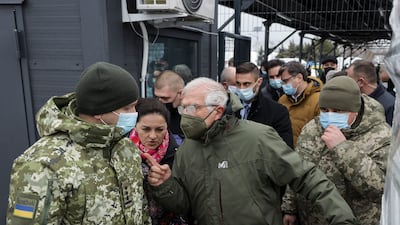Ukraine and the EU must be at the table in any peace talks aimed at resolving worsening tensions with Russia, the European bloc’s top diplomat Josep Borrell has said.
Mr Borrell said the world was “no longer in Yalta times”, referring to the 1945 conference at which Europe was carved up by the wartime leaders of the US, the Soviet Union and Britain.
The EU’s foreign policy chief spoke after taking a helicopter to eastern Ukraine in a show of solidarity with government forces under pressure from pro-Russian separatists.
After visiting the so-called line of contact between the opposing camps, he said the long-running conflict had led to families being split on either side of the barrier and people lacking access to basic services.
This conflict is “on the verge of getting deeper”, tensions are building up with respect to Europe as a whole and the situation is worsened by Russia’s “very unusual” troop movements on Ukraine’s eastern flank, said Mr Borrell.
Amid fears of a Russian invasion, Nato foreign ministers will hold emergency talks on Friday before US and Russian envoys meet in Geneva next week.
But Ukraine, which is not in Nato, and the EU must be at the centre of talks on European security, said Mr Borrell.
“The delimitation of a sphere of influence of the two big powers does not belong to 2022,” he told a press conference, after referring to Yalta, which is on the Crimean peninsula annexed by Russia from Ukraine in 2014.
“The security of Europe and the security in Ukraine … is something that first and foremost affects Ukrainians and Europeans,” said Mr Borrell.
“Any discussion about Ukraine must involve Ukraine, first of all. And to talk about security without Europe cannot be done without not only the consultation but the participation of the Europeans.”
Ukraine’s government has battled pro-Kremlin separatists in two eastern regions bordering Russia since then, in a conflict estimated to have killed more than 14,000 people.
The latest build-up has seen about Russian 100,000 troops assemble on the border with Ukraine, sparking fears that Moscow plans to invade its ex-Soviet neighbour.
Russia’s demands for peace include a veto on Nato expansion, which would block Ukraine and others such as Sweden and Finland from joining the alliance. The countries concerned have said Nato membership is a matter for them.

Mr Borrell said the EU was open to dialogue with Moscow but would not waver in its commitment to Ukraine’s sovereignty and territorial integrity. He called on Russia to de-escalate and abide by previous peace agreements.
Negotiations with Russia must come alongside a clear message that any military aggression would have severe consequences for Moscow, he said, echoing the warnings repeatedly issued by the West.
“Our main purpose is to try to de-escalate the tensions through these negotiations and others that will follow, but also through a strong stance and firm position on supporting Ukraine,” he said.
He said the EU was “co-ordinating with the US, with Nato and other like-minded partners in order to work for de-escalation”.
The White House has promised to consult with Kiev and was separately holding talks with Germany on Wednesday.
Ukraine’s Foreign Minister Dmytro Kuleba, who accompanied Mr Borrell to the line of contact, welcomed what he said was strong support from the EU.
He described Mr Borrell’s trip as a “very timely visit against the background of Russian blackmail, escalation and threats”.


